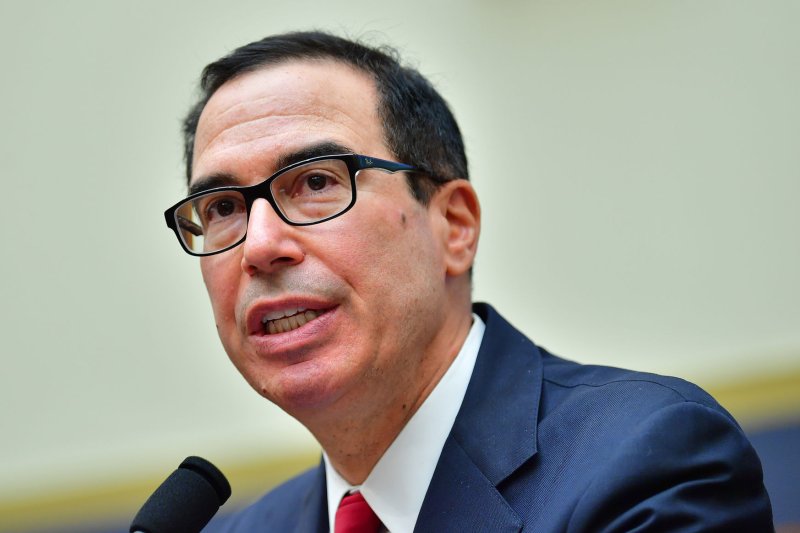Treasury Secretary Steven Mnuchin. Someone needs to start worrying about debt. File Photo by Kevin Dietsch/UPI |
License Photo
In Roman times, the midpoint of the month was called "the ides," hence the ides of April. Famously, according to Shakespeare, Julius Caesar was warned to beware the ides of March. He did not and was assassinated. Today, we need to beware the ides of April and for more profound reasons than this is tax day.
The economy we are told by the White House is strong, so strong that adding former presidential candidate Herman Cain and talking head Stephen Moore to the Federal Reserve Board can do no harm. Unemployment remains below 4 percent. The Dow Jones flirts with 26,000 and the NASDAQ 8,000. While annual growth has slowed, corporate earnings remain high. So the story goes.
Hidden, however, on this ides of April are several potential flaws that could fracture both the economy and financial markets as occurred in 2008. For those who may not remember or simply were too young then, the crash was caused by enormous leveraged debt in the housing and mortgage markets. This bubble was based on the erroneous belief that housing prices could only go in one direction -- up.
Decades of what would turn out to be catastrophic policy errors induced millions of Americans to buy homes they could only afford at initially low adjustable interest rates. This allowed banks to manufacture credit default swaps and mortgage-backed securities that produced huge fees predicated on the seemingly permanent cash flows accruing from monthly home mortgage payments. These securities were "sliced and diced" into investment vehicles that combined both solid and risky loans -- except no one knew how much of each was covered in a particular offering.
Minorities were able to buy homes -- a goal of Americans to own their own residences -- incentivized by a series of administrations. All was well until the music stopped. Housing prices declined. Interest rates went up. For a large segment of new home owners with adjustable interest rates, the increases became unaffordable. Cash flow stagnated. Defaults exploded as home prices dropped below the outstanding mortgage balances. The consequence was the great crash of 2008.
Do we learn? Today, banks are rushing to make "leveraged loans" to troubled corporations and businesses. Not quite "junk bonds," these loans produce high fees and interest rates well above prime. Packaged into financial instruments and "sliced and diced," these vehicles are highly attractive to investors seeking high rates of return especially as alternative investments for hedge funds.
The New York Times reported that about $1 trillion of these leveraged loans are on the books so far. Given the net worth of the nation that is well in excess of $100 trillion and a national debt that is about $22 trillion, $1 trillion seems a small number. But what happens if a recession breaks out, interest rates increase or a number of the corporations fail? This could be 2008 on steroids.
At the same time, pension fund liabilities, that is money owed against present assets, are estimated at about $1 trillion. This does not include Social Security and other government-backed programs. One can readily see how this situation can take a nasty turn, especially with annual budget deficits approaching $1 trillion.
A further potentially explosive ingredient as the Financial Times reported last week is that while corporate earnings have soared in large part because of the capital gains cut to 15 percent, so too is corporate borrowing in the ascent due to low interest rates. This adds to the leveraged loans condition. Hence, several conditions are present that could make for some very unpleasant economic trends.
In testimony before Congress, the big banks claimed that their balance sheets and financial stability are healthy. One hopes. Still, Congress has not addressed the combination of leveraged loans and pension fund shortfalls, let alone taking steps to rein in growing annual deficits.
The White House continues to sing it siren-like song of a strong economy persisting certainly through Donald Trump's second term, making it a central plank in the 2020 election. Meanwhile, the more left- leaning Democrats call for public education and Medicare for all and a Green New Deal without any reference to whether this is affordable, even if the so-called rich are forced to pay the bill with higher taxes.
We have been here before. But in 2008, Henry Paulson was at Treasury and Ben Bernanke at the Fed. With due deference to current Fed Chairman Jerome Powell, Treasury Secretary Steve Mnuchin is no Paulson, even though both were Goldman Sachs alumni.
Someone needs to start worrying or at least examining these hides of April. If not, should a new 2008-like financial crisis break out, do not be surprised.
@harlankullman.















